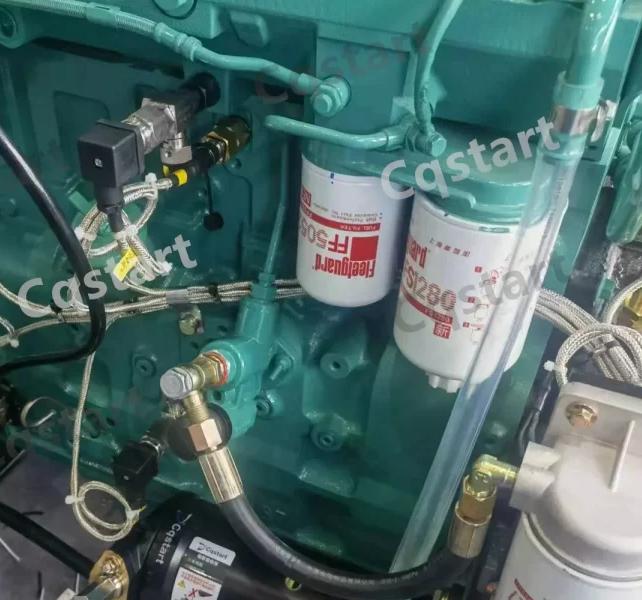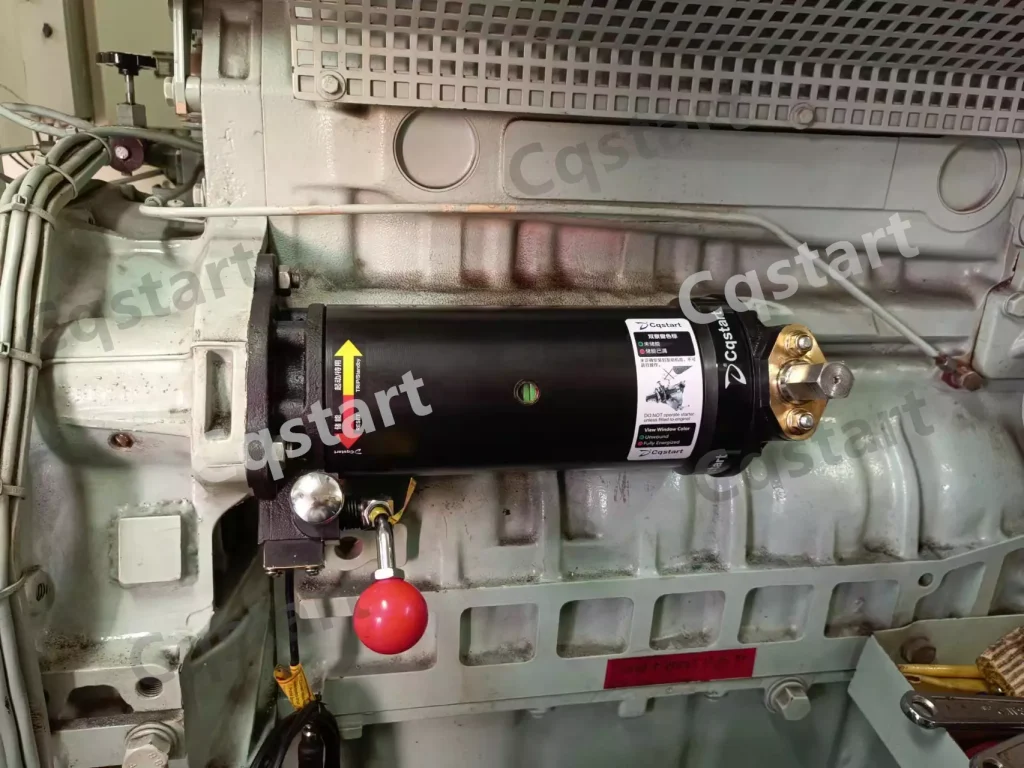Preventive maintenance on a diesel engine is non-negotiable for those who want their engine to operate efficiently, save fuel, and stay away from costly breakdowns. If you own a truck or generator, construction equipment, or a marine engine, regular, routine checks will always surpass last-minute repairs. Here are five easy Diesel Engine Maintenance steps—with special attention to the fact that spring starters are an essential component that provides unshakeable security. Each tip is based on practicality and designed to keep your engine in top condition without any hassle.
Step 1 – Change Engine Oil & Filters
Diesel engine maintenance starts with oil. It’s your engine’s “lifeblood.” If you don’t have clean oil, the moving parts squeak together and cause premature wear and costly repairs. This is among the most important for a long engine longevity.

What You Need to Do
Change the oil filter and oil each 250-500 hours (or sooner if you sit frequently or make use of low-quality fuel).
Make sure you use oil that is compatible with the specifications of your vehicle. Look for viscosity grades such as 15W-40 or 10W-30 and ratings such as API CF and ACEA E7.
Connect drain plugs securely and install new filters properly to avoid leaks.
Quick Inspection Tips
- Make sure you check the oil pressure as the engine is running. Ensure that it’s within what the company’s “normal” range.
- Find oil leaks around seals, gaskets, and plugs (a small leak here or there can quickly turn into a huge issue).
- Take a sniff and look at the color of the oil If you smell a strong burnt or dark oil, it suggests it’s time for a change.
- Perform an oil test each 500-1,000 hours in order to spot wear or contamination earlier.
- Diesel Engine Maintenance here isn’t difficult. Just follow the guidelines and you’ll be able to avoid the majority of problems related to oil.
Step 2 – Inspect & Replace Fuel Filters
Clean fuel is essential to keep the diesel engine at a high level and clean; therefore, fuel filter checks are essential to ensure effective diesel engine maintenance. Dirt, water, or algae in fuel can block injectors, reduce power, and cause difficulty starting.
Maintenance Actions for Fuel Filters
Replace the main and second fuel filters every 250-500 hours (follow the instruction manual for your engine).
After changing filters, remove air from the fuel system. Air bubbles can cause stalls.
Use fuel that is ASTM D975 standard or EN 590 standard to reduce gunk.
What to Check
Monitor the pressure gauge of the fuel filter. If the pressure rises above the warning, change the filter.
Remove water from fuel tanks and separators every month (more frequently in humid regions).
Verify the fuel lines for loose connections, leaks, or rust. The fuel is out and can present safety hazards.
Step 3 – Maintain Air Filters & Intake Systems
To function properly, diesel engines require a great deal of unpolluted air, which is why taking proper care of air filters is an important aspect of diesel engine maintenance. If an air filter is clogged, it can severely limit airflow and be a cause of fuel inefficiency. Additionally, unfiltered dirt and debris can destroy engine components over time.
Filter maintenance
Depending on the conditions, air filters should be checked every 500 hours of activity or even more frequently within very dusty environments like construction sites.
Replacing a filter is necessary once a filter is significantly dirty. Air filters should not be cleaned, no matter the pressure of the air, as high pressure can cause unfiltered air to enter the engine through ruptured filter material.
If your engine has them, replace your pre-filters and cyclonic separators frequently based on the dusty conditions.
Intake system maintenance
- Check the air intake system for cracks in the air hoses and ensure the clamps are properly fit. If the air intake system has cracks from corrosion, dirty air can enter the engine which introduces a maintenance concern.
- Ensure the intake manifold gasket is properly fastened. Fuel/air mixing is crucial for proper engine function and leakage of air or fuel can create problems.
- For engines intended to operate mostly in coastal or marine environments, check the intake components for corrosion from salt.
- Diesel engine maintenance can be a matter of life or death for the engine and recent air filter inspection is crucial for preventative maintenance to avoid large repair costs in the future.
Step 4 – Keep Cooling & Lubrication Systems in Shape
Overheating ruins diesel engines fast, so cooling system care is critical for Diesel Engine Maintenance. The lubrication system (beyond oil changes) also needs attention to reduce friction and wear.

Cooling System Maintenance
| Task | Interval | Quick Tip |
| Check coolant level | Daily (when engine is cold) | Top up with manufacturer-approved coolant—don’t mix types! |
| Test coolant condition | Quarterly | Aim for a freeze point of -37°C to -40°C and good boiling point. |
| Clean radiator fins | Annually | Use a soft brush or low-pressure water to remove debris. |
| Inspect hoses/clamps | 500 hours | Replace cracked or brittle hoses—they burst when hot. |
Lubrication System Checks
Go for a walk every week to check for oil leaks, especially around the turbocharger, gaskets, and oil lines.
Maintain oil levels in the dipstick’s “safe” range. Keeping the oil level too low will cause unnecessary friction, while keeping the oil level too high will cause foaming.
Keep an eye on your oil pressure while driving. If it suddenly drops, you have a problem (like a pump that’s going to fail).
Keeping these systems in good working order will mean your diesel engine will always run nice and cool without any overheating catastrophes.
Step 5 – Test Batteries, Electrical Parts & Prioritize Spring Starters
The reliability of electrical systems is essential to Diesel Engine Maintenance, but spring starters are the unnoticed heroes that ensure operation in the event that batteries fail or power is lost. For those who depend on diesel engines in crucial or remote locations, spring starters aren’t just an option for backup. They’re indispensable to ensure Diesel Engine Maintenance.
Battery & Electrical Maintenance
Test battery voltage every quarter. A healthy battery is 12.0V or more (replace if the cold cranking amps decrease; weak batteries fail quickly when they are in high demand or cold temperatures).
Clean the battery’s terminals using wire brushes (corrosion interferes with the flow of power) and then apply dielectric grease to avoid the formation of rust.
Make sure the alternator is working properly: It should be charging at 13.5-14.5V when it is idle (a defective alternator can drain batteries and can leave you stuck).
Examine wires, fuses, and relays for signs of connection problems or corrosion. Repair them before they lead to an outbreak.
Spring Starters

Spring starters are battery-free, mechanical starting systems that convert “can’t start” into “up and running”-and they’re not a requirement for dependable Diesel Engine Maintenance in harsh or remote situations. In contrast to electrical starters, which rely on batteries charged or power sources, spring starters make use of the stored energy of mechanical power (wound with a lever or hand) to start the engine, which makes them essential to:
- Remote worksite (mines, farms, offshore platforms) in which power is not available.
- Colder conditions (sub-zero temperatures) can affect battery performance. Spring starters are able to work in all weathers.
- Equipment for emergency (backup generators, Rescue vehicles, backup generators) in which downtime equals risk.
- Long-idle motors (batteries run out over time) – spring starters omit this issue completely.
Essential Spring Starter Maintenance
| Spring Starter Task | Interval | Why It’s Critical |
| Check spring tension | Quarterly | Weak tension = failed cranking—test by winding and releasing (should feel firm and consistent). |
| Inspect clutch/ratchet mechanism | 500 hours | Worn or damaged parts cause slipping—ensure smooth engagement with the engine flywheel. |
| Clean and lubricate moving parts | Annually | Dirt, rust, or dryness jams the mechanism—use manufacturer-recommended lubricant to prevent seizing. |
| Test full operation | Every 6 months | Wind and activate the starter (with the engine off) to confirm it cranks smoothly—catch issues before you need it. |
For Diesel Engine Maintenance that you can trust in any situation, spring starters aren’t an add-on—they’re a core component. They turn the risk of a dead battery into a non-issue, ensuring your engine starts when you need it most.
Pro Tips for Trustworthy Diesel Engine Maintenance
To prolong the life of your engine and improve your Diesel Engine Maintenance results, follow these proven tips:
- Make sure you use OEM or high-quality replacement parts. Cheap ones fail quickly and can void warranties (this is true for spring starters as well–original parts guarantee the reliability).
- Maintain detailed records: Keep track of dates, the parts used, the spring starter’s test result (this aids in determining the warranty claim, value of resale and keeping track of maintenance trends).
- Anyone who is using the engine to use spring start-up: Make sure that your team is aware of how to utilize it in the event of an emergency. Training helps you become better.
- Consider investing in a few tools like a tension tester for the voltage range, oil dipstick and a spring tension gauge make maintenance much easier and more precise.
- For heavy-duty use or fleets: Combine spring starters with condition monitoring tools (like oil sensor) to build a fail-safe Diesel Engine Maintenance program.
Conclusion
Diesel engine maintenance doesn’t need to be complex. Five key steps—oil/filter replacement, fuel filter checks, air intake maintenance, cooling system upkeep, and electrical (plus spring starter) tests—cover the essentials for unbeatable performance. With simple guidance, clear schedules, and expert tips, anyone can keep their diesel engine in top shape.
Spring starters are critical backup components for your diesel maintenance routine—especially for remote areas, cold climates, or emergency-dependent gear. Stick to the schedule, prioritize spring starters, and follow best practices to extend engine life, cut costs, and avoid unexpected breakdown stress. Start your diesel maintenance today. With spring starters, you’ll never face an unresponsive engine again.

